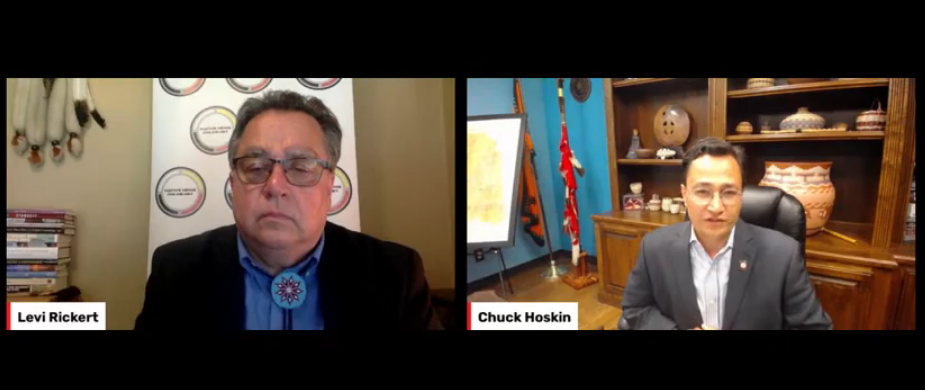
- Details
- By Native News Online Staff
On Native News Online’s live-streamed event “Overcoming Opioid Abuse in Indian Country,” four panelists from across Indian Country provided insights into the problem that afflicts Indian Country and beyond.
Moderated by Native News Online publisher and editor Levi Rickert, the live stream panel last week consisted of Cherokee Nation Principal Chief Chuck Hoskin, Jr.; former Shinnecock Nation tribal chairman and current Tribal Ambassador Lance Gumbs; Ashley Hesse, vice president of policy at Indigenous PACT; and Jason Sunby, chief operating officer of Deterra Drug Deactivation System.
Want more Native News? Get the free daily newsletter today.
The CDC reported that there were 13.7 per 100,000 related deaths for Native people in 2016, and the opioid death rate for Native Americans in Oklahoma is three times higher than the nationwide rate for non-Natives.
The opioid crisis
“Opioid addiction is a real problem, but it's part of a larger array of challenges that we have in dealing with behavioral health,” Chief Hoskin said.
In 2015-2016,184 million opioid painkillers were shipped by pharmaceutical distributors into the Cherokee reservation. That is about 153 opioids per individual. These communities are being overrun with opioids, according to Chief Hoskin.
In 2017, the Cherokee Nation was among several tribes that filed lawsuits against opioid manufacturers and pharmacies. Chief Hoskin says the case is still in the state court system and could not discuss certain aspects of the case, but he remains confident the Cherokee Nation will prevail in the end.
He said litigation is not the only avenue of justice.
WATCH THE LIVE STREAM
“Part of the way we get justice at the Cherokee Nation is to make sure we build a health system that can care for the people who are affected,” Chief Hoskin said.
Hesse spoke about the effort of working with tribes to establish opioid treatment programs to support Native Americans on the mental health side.
“Part of the fight against opioid abuse is behavioral and mental health assistance,” Hesse stated. “In an overall program, there's key components that really drive success, and that success really starts with those individual goals and how we support that individual person.”
Hesse continued by saying “there is a significant number of undercounting of opioid overdose cases in Native communities. Our communities are experiencing overdose rates that far exceed other demographic groups.”
Shinnecock Ambassador Lance Gumbs, who also serves as the alternate vice president in the northeast region for the National Congress of American Indians, said that his position enables him to better help Native communities with the opioid crisis.
Gumbs recounted how he lost his son two years ago because of an opioid overdose.
He describes part of the opioid abuse because of the high rates of unemployment in tribal communities.
“They didn't have anything to do, and this became the thing to do,” Gumbs said.
The Shinnecock Indian Nation is also part of a lawsuit against pharmaceutical companies. Gumbs said he hopes any monies that may result from the lawsuit would go towards educational and mental health programming to help those struggling with addiction.
Dealing with the opioid crisis during the Covid-19 pandemic
Chief Hoskin explained the Covid-19 pandemic exposed some of the cracks in their healthcare system in terms of helping those with opioid addictions. Building strong behavioral health programs has been a pillar of their fight against the opioid crisis.
In late May, the Cherokee Nation introduced a mental wellness program that allows for its government employees to take two months off per month for mental wellness.
Support our mission to create journalism that inspires, uplifts, and informs Native Americans.
Ambassador Gumbs said the Shinnecock Nation was hit hard by the Covid-19 pandemic. He lost his mother and two brothers to the deadly virus last winter.
Gumbs said on the Shinnecock Indian Nation, the opioid crisis was lessened after his tribe filed the lawsuit so during the pandemic the tribe could devote its time on dealing with extreme food shortages on the Long Island.
Proper Disposal of Unused Pills
The panelists agreed there are no simple fixes to overcome the abuse of opioids in Indian Country. One solution to eliminate the overabundance of opioid drugs is to provide proper disposal methods of unused drugs.
According to Sundby, who runs Deterra Drug Deactivation System, some 80 percent of opioids go unused and just sit in people’s bathroom cabinets. Flushing unused drugs down the toilet is not advised due to environmental issues.
Sundby discussed Deterra’s drug deactivation product as an avenue of curbing opioid use. The product, already being used on the Cherokee Nation, is an at-home drug deactivation and disposal product. Sundby explained that it works by putting any medication into the small pouch, which you then fill up halfway with water. The product will then dissolve the medication and you can dispose of the now liquid down the drain. The product dissolves medication in a way that won't contaminate the groundwater. The pouch is environmentally friendly because it is made out of sugarcane and has no carbon footprint.
Chief Hoskin stated that the fight against opioid use needs to be done with both litigation measures against distributors and with successful opioid education programs. He says having places to discard opioids is also highly important as well.
Ambassador Gumbs says that part of the fight starts with our youth and working on curtailing how easy it is to get access to opioids.
More Stories Like This
National Indian Health Board's Strategic Plan Listening Tour Underway‘You Are Never Alone’ | How One Tribe Is Fighting Youth Suicide With Culture and Crisis Response
‘Our Culture is Prevention’
This National Cancer Prevention Month, Reduce Your Risk
New Mexico Will Investigate Forced Sterilization of Native American Women

